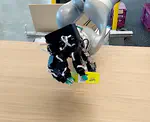NVIDIA Seattle Robotics Lab
Welcome to the homepage of the NVIDIA Seattle Robotics Lab led by Professor Dieter Fox. Our research group was founded in 2017, and is primarily based in Seattle.
The charter of the lab is to drive breakthrough robotics research to enable the next generation of robots that perform complex manipulation tasks to safely work alongside humans and transform industries such as manufacturing, logistics, healthcare, and more.
Research Areas
Enabling the next generation of robots requires progress in multiple areas of research, including robot control and reinforcement learning, computer vision, human-robot interaction, deep learning, and physics-based simulation. The Seattle Robotics Lab (SRL) brings together experts from these disciplines to work toward the joint goal of robots that can interact with the physical world and collaborate with people. Here are some of our key research areas:
News
- We are looking for Research Scientist and PhD Research Interns. November, 2024
- We are looking for PhD Research Intern, Robotics - 2024. October, 2023
- We are looking for Research Interns in Robotics for Summer 2023. November, 2022
- Fabrics are a class of autonomous, second-order differential equations that serve as a smooth, stable medium for encoding prior experience in robot control. Join us to learn more at the IROS 2022 Tutorial. October, 2022
- This year’s Robot Learning Workshop at NeurIPS aims at discussing unique research challenges from the lens of trustworthy robotics. Bringing together experts with diverse backgrounds from the ML and robotics communities, the workshop will offer new perspectives on trust in the context of ML-driven robot systems. September, 2022
- 6 papers are accepted to CoRL 2022. September, 2022
- 12 papers are accepted to ICRA 2022. Join us to learn how NVIDIA is shaping robotics research and development. March, 2022







